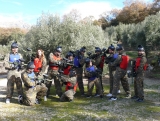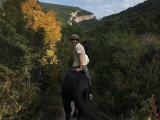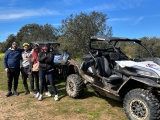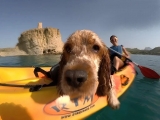If you're considering some climbing with them, here are some tips.
1. Avoid doing the activity on excessively hot or cold days. Regarding heat, we know physical exertion in high temperatures isn't advisable; as for cold, hands or feet can become so numb they lose feeling, consequently risking secure contact with the rock for both limbs.

2. Choose a simple climbing spot where you know there won't be too many people to obstruct them or have them obstruct other children. Moreover, the ideal is having approach routes that allow you to take your time and relax between climbs. Here are all your options.

3. The equipment used by children must be child-specific: helmet, climbing shoes, and harness. For shared gear like ropes, harnesses or quickdraws, ensure everything is in perfect working condition.

4. It's highly recommended to have several adults in the group, as one person alone can't properly watch the climbing child and those playing at the base. The fewer distractions, the better.

5. Before starting, clearly explain all techniques for both ascent and descent. This is crucial to prevent injuries. Demonstrate rappelling technique or, if they won't be doing it, stress that they must keep their body relaxed when being lowered and not grab the rope.

6. Constantly check the equipment, especially before each climb, as children might unintentionally tamper with safety elements like knots, helmet fastenings etc.

7. Make absolutely clear they must never pull on quickdraws to assist their climb. Many climbers, adults included, have felt this temptation, but it's extremely dangerous.

8. Choose routes with linear direction - straight paths are best, as zigzagging routes could make a slipping child swing dangerously or tumble during descent.

9. Pay special attention to equipment like ropes or Grigris, as these are typically designed for adults and might not function properly (Grigris are very safe, but a child's light weight might prevent proper engagement).

10. Supervise children at the base carefully. As mentioned, having adults present is essential, but they shouldn't stand too close as rockfall could occur. If toddlers are in buggies, secure them properly in case of accidental movement.

But above all - common sense!!
Got any other tips? Comment below!












